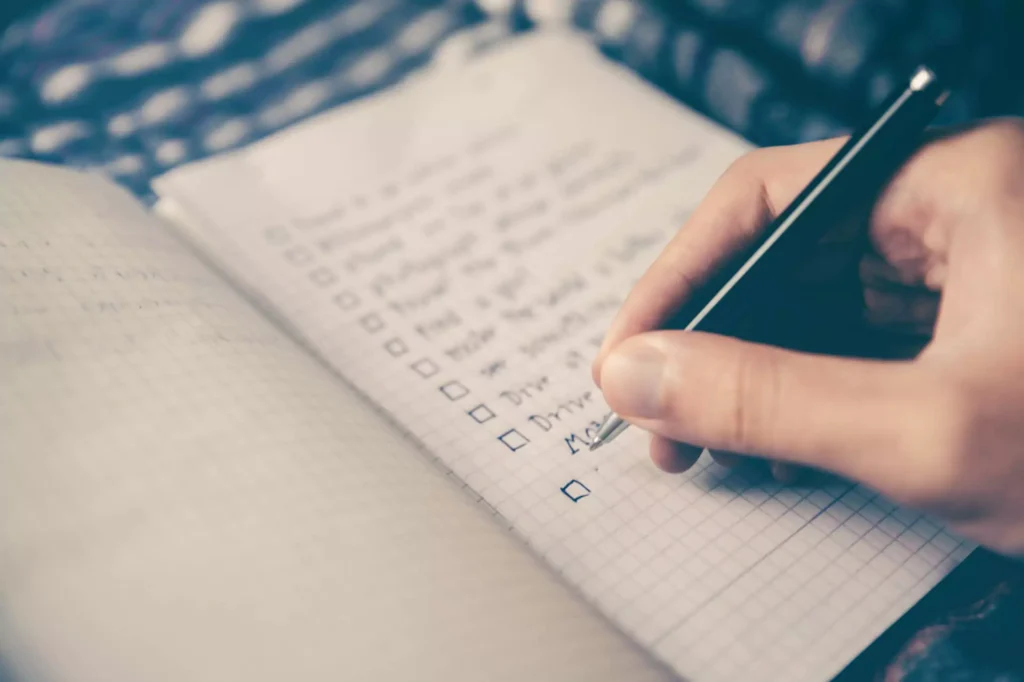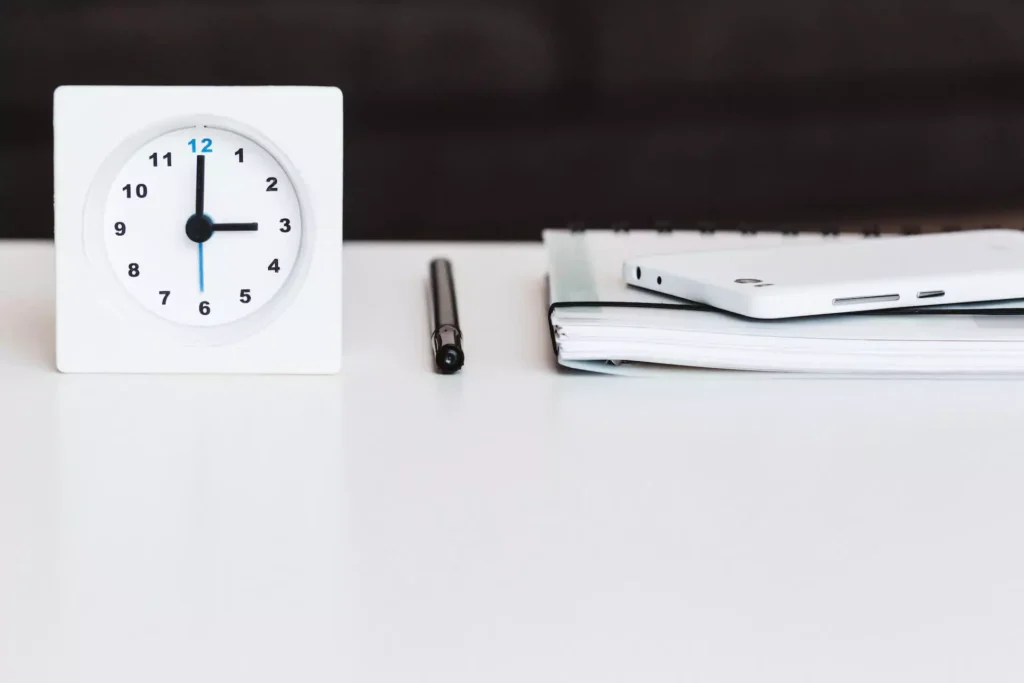A quick search for “Time Management tips for students” doesn’t yield much useful information. Set up a plan. Prioritize. Get enough sleep. These advanced tips can only get you so far. It would help if you were more strategic to maximize your time and get ahead on school projects.
Everyone, not just students, must plan their days with a goal in mind. It’s about taking charge of your time and using it most effectively for productivity, focus, and, most importantly, balance.
To help you out, we’ve put together the best tips from students in both undergraduate and graduate programs on how to stay focused, stop putting things off, and manage your time.
Table of Contents
1. Plan your time with a daily schedule template

Even though classes, seminars, and workshops may take up most of your day, how you plan your time can make a big difference.
Most of the time, management advice for students is about making a list of things to do. However, it’s more important to learn how to use your schedule.
You are in charge when you have a template for your daily schedule. It will help you stay organized, keep your mind on what’s most important, and even stop putting things off.
Many of the world’s most successful people, like Bill Gates and Elon Musk, use time blocking. Time blocking is just planning how to spend each minute of your day.
This might seem like a lot. But it is more of a guideline than a strict list of rules. Here are some suggestions:
Step 1: Give each day a “bookend.”
It would help if you planned how you start and end each day to make the most of your time. Think about what you do in the morning and evening, and then “block” time for the most important things. For example, Kevin Taylor, a professor, can’t write for two hours every morning:
Step 2: Give your most crucial project time.
Next, you should make time for your most important projects. This could mean doing research, writing, or something else entirely. Knowing what you’re doing and when it will happen is essential.
You can now use RescueTime for Google Calendar to set up automatic FocusTime sessions if you need help staying on task during this time.
Just put #focustime in the name or description of a Google Calendar event, and all distracting sites like News, Entertainment and Social Media will be blocked for the duration of that event.
Step 3: Plan breaks, time with friends, and catch up on work.
Lastly, a schedule has to be possible for it to work. This means making time for breaks, food, exercise, social time, calling family and friends, and all the other “non-school” things that keep you happy and motivated.
2. Figure out how you spend your time now (and where you’re wasting it).

Your schedule will show you how your day should go, but if you want to get better at managing your time, you need to know how you spend your time.
With a clear picture of how you spend your time daily, you can make better time management plans and stay on task.
You need to know where you’re wasting time on the wrong things, just like a dieter needs to keep track of what they eat to see where they’re sabotaging themselves.
3. Set realistic goals so that you can track your progress.
Setting goals is a great way to get yourself to do your homework. Most of us set goals incorrectly, which could be better. The problem is that goals are just what you want to achieve. They don’t give you any information about how to reach them.
Instead of starting with the goal and working backwards, think about what needs to be done to reach and exceed that goal. So, in short:
What can you do every day to help you reach your end goal?
This means focusing on making steady progress and getting into better habits.
For example, you must write a 4,000-word essay by the end of the month. Set a daily goal of writing just 500 words instead of being overwhelmed by the big picture. If you can keep this up, you’ll hit your goal in just over a week (giving you plenty of time to edit and rework it) (giving you plenty of time to edit and update it).
Even better, seeing daily progress will make you want to do more. Teresa Amabile of Harvard looked into everything that can improve our mood and motivation and found that “making progress on meaningful work is the single most important thing.”
4. Break up big projects into small tasks.
Setting reasonable goals is breaking down big plans into smaller, daily tasks. This not only keeps you on duty, but it can also help you stop putting things off.
When a project seems like a big job, putting it off is easy, but taking that first step is often all you need to start moving forward.
For example, if you have to write an extended essay, you could break it up into a few steps:
Go to the library and find the particular books on the topic
- Read through their table of contents.
- Write out the titles of your paragraphs.
- Write a summary of the first sentence. Etc.
You can do each step to feel safe about the end goal.
5. Don’t fall for the planning mistake
When planning your day, it’s easy to be too confident about how much you can get done. This is called the Planning Fallacy by psychologists. This hurts your ability to manage your time in several ways:
When things take longer than you thought, you’re more likely to feel stressed.
Your plans are changed to make up for the extra time you spend.
You may take on too much work because you have more time than you do.
To avoid the Planning Fallacy:
Add a buffer to your schedule based on how well you know how to do the task.
If you’ve done it before, give yourself between 1 and 1.5 times as long as you think it will take.
If you’re trying something new, give yourself at least twice as much time.
6. Pay attention to the highs and lows of your body’s energy.
Everyone has times during the day when they feel more alert and energetic. You can’t fight against your body’s natural state to make the most of your daily time.
Researchers call this our Circadian Rhythm, a 24-hour clock that runs in the background of your brain and changes how alert you are.
Everyone has a slightly different rhythm, but most people have a similar pattern.
So what does this mean for how students use their time?
It would help if you did your most important work when you had the most energy. This means you should plan to write or do more intense projects when your point is high and read or do less active things when your energy is low.
7. Take breaks when you should.

Taking more breaks is one of the best ways to keep working hard over time. But how do you know when to take a rest?
Nathaniel Kleitman, a sleep researcher, says that after 90 minutes of hard work, our minds need a break. Even if you don’t set a timer, your body will let you know when you need a break by making you hungry, tired, restless, or unable to concentrate.
When you feel like this, you should take a break. You can make the most of your free time by doing the following:
- Stop working on whatever you were working on before. Get up from your desk or work area and try to take your mind off what you’re doing.
- Get outdoors if you can. Fresh air and natural light give you more energy and help you get more done.
- Give your eyes a break. To reduce the time spent reading or watching screens, try the easy exercise “20-20-20.” Stare at something at least 20 feet away for at least 20 seconds about every 20 minutes.
- Eat the right food to keep going. Protein-rich foods will give you more energy for a longer time than caffeine or carbs.
8. Use the 5-minute rule to stop putting things off
Everyone puts things off. However, you don’t have to let it control your day. Most of the time, all it takes to get into the flow of a task is a little bit of will.
Try a few of these ways to get over the initial hump of feeling unmotivated:
Use the five-minute rule. Kevin Systrom, who started Instagram, made this “rule” famous. It means that you only work on a project for 5 minutes. Most of the time, that’s enough to get you going.
Don’t let anything get in the way when you start working. When you have social media and entertainment at your fingertips, putting things off is more accessible.
9. Use your study time best to get into the flow
When your schedule is complete, it’s easy to think you can do more than one thing simultaneously. But the more things you try to do at once, the longer it takes to do everything. Instead, studies have shown that focusing on one task at a time and doing it well can be up to 500% more productive.
But this isn’t an easy way to “single-task.” If it’s hard for you to concentrate on one thing, try these steps:
- Take away all distractions (including your phone)
- Begin small and set a timer (even 5-minutes of distraction-free work time is beneficial)
- Give yourself a break between each session
10. Make better habits and routines to be successful in the long run.
We become what we consistently do. The best way for students and everyone else to manage their time is to make habits and routines that help them do more of the things they want to do.
For example, following a morning routine helps you get a quick win and prepare for a productive day. Or, set your schedule and goals for the next day the night before and ensure your evening routine helps you succeed the next day.
Bonus: Apps for your phone that will help you stay on task. Keeping yourself motivated and on a mission when studying can be challenging. The team at Brainly put together a list of 7 powerful apps that you can use to help you get ahead.
